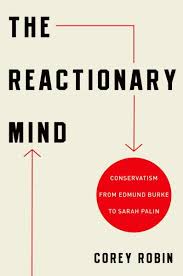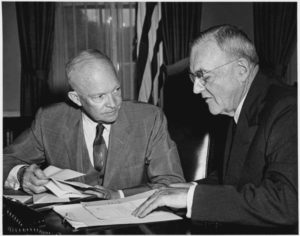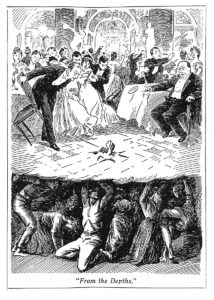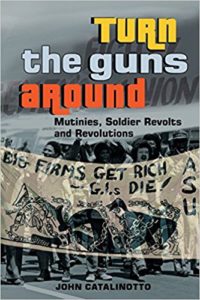Book Review: “The Reactionary Mind: Conservatism from Edmund Burke to Sarah Palin” by Corey Robin

The 2011 edition is available at the New Orleans Public Library.
By Gregory William
Political science professor, Corey Robin, has been hailed as the man who predicted Trump. He does not appear to be a psychic; but in 2011 he did publish a remarkable book (the Reactionary Mind), which traces the historical development of the political right. His analysis shows figures like Sarah Palin and Trump to be very much in keeping with recurrent aspects of this long tradition. They are not the absolute outsiders that they have been described as being (the image of the anti-establishment outsider is something that they themselves have cultivated).
The book traces the long arc of right-wing thought and political movements from the English Civil War of the 1600s, to the French Revolution, to our own time. He finds common features in the thinking of white slave-owners in the American south down to the political machinations of the G.W. Bush administration and its imperialist “war on terror.”
What is right, what is left?
The book is certainly useful for learning about an array of historical episodes, but also because Robin develops a framework for differentiating right from left, based on concrete analysis.
What is right-wing politics, or political reaction (Robin uses the terms interchangeably)? The question is difficult because we see that different figures associated with the right have advocated different things over the course of history. Early conservative figures in France, for example, were pro-monarchy and suspicious of the capitalist market. Today’s U.S. right-wingers, on the other hand, usually say that their commitment to unregulated markets is precisely what makes them conservatives; being pro-market, they say, is the essence of conservativism. Or, they say that the defining feature of conservativism is a commitment to “individual liberty” or “traditional values.”
Making the situation even more confusing, rightists (including neo-fascists) make appeals to the working class, or at least sections thereof (i.e. white workers, or “native” workers against immigrant workers), promising all sorts of things.
Is there a consistent way to distinguish right from left?
Robin argues that, yes, there is. Here is one of his most direct definitions of the right offered up in the book: Conservative thinking comes from “the felt experience of having power, seeing it threatened, and trying to win it back.” He makes a strong case that, in every historical period, conservativism stems from the reaction of the elites (whether monarchs, aristocrats, slave-owners, or present-day capitalists) to progressive movements for liberation and equality. It is a politics of maintaining power, or of restoring power.
The Old South, Guatemala, and the oppressed’s right to speak
One especially interesting aspect of Robin’s analysis is the attention he gives to the politics of the slave-owning class of the old south. He suggests that—in many accounts of the right—too much emphasis is placed on reaction to the French Revolution, whereas, some of the most developed right-wing politics came out of the U.S. south, and that this politics is much more the precedent to the right-wing movements of the 20th and 21st centuries.
For example, he analyzes the statements of John C. Calhoun (1782-1850), the southern politician from South Carolina and seventh vice president of the United States who is often regarded as the chief theorist of the pro-slavery stance. Robin shows how Calhoun was horrified by even the most minimal protests of the oppressed. When the petitions of the enslaved and formerly-enslaved were read in Congress, Calhoun reacted violently. He felt that even allowing the speech of the oppressed in public discourse was tantamount to the beginning of revolution, to the beginning of the end of the “southern way of life,” i.e., the slave system.
One can see parallels in the way that present-day white supremacists have reacted to black athletes kneeling in protest against the widespread murder of black people by police. For these racists, taking a knee is going too far; on the flip side, we can see how these kinds of simple gestures can, in fact, radically shake things up, altering the terrain of struggle in a given period. Unlike Calhoun, we regard that as a good thing.
Similarly, Robin observes how Guatemalan elites (including Catholic clergy) reacted to the 1951-1954 presidency of Jacobo Árbenz Guzmán. Árbenz, as he is usually known, was the second democratically-elected president of Guatemala. With massive popular support— in a coalition with the Communists and other forces— the Árbenz government enacted a series of progressive policy changes including agrarian reform (breaking up large agricultural estates and giving land to the poor farmers, who were mainly indigenous and who had lacked power since the time of Spanish colonization). Elites were horrified by the mere fact that the poor and oppressed were suddenly entering public life and were allowed to speak. This, in itself, they found intolerable.
The United Fruit Company, which was active in the country, felt that their profits were being threatened by the Árbenz government, and they called on Washington to overthrow the democratically-elected leader. This was one of the opening salvos of the Cold War. The alliance of the U.S. government, the United Fruit Company, and the old Guatemalan elites imposed a regime of terrible reaction, in the form of military dictatorship, leading to civil war in the following decades. Robin explores all of this in detail.

U.S. President Dwight D. Eisenhower and Secretary of State John Foster Dulles, the advocate of the 1954 Guatemalan coup d’état that installed the right-wing dictatorship
At any rate, in today’s struggles, we need the kind of sharp lens that Robin affirms. Revolutionaries should be able to see the politics of Trumpism for what it is, but also look at our times more broadly. We have to be able to pose certain questions before the masses. For example, is the Democratic Party a left-wing or a right-wing party? The ultra-reaction of the present-day Republicans should be clear enough.
But if right-wing politics is about preserving existing power arrangements, then the Democratic Party’s consistent militarism, commitment to capitalism, and more, suggests that it is a right-wing party as well. We should not forget the concise statement to this effect from Democratic Party leader, Nancy Pelosi. At a 2017 “town hall meeting” organized by CNN, NYU sophomore, Trevor Hill, suggested to Pelosi that many in the country (especially young people) want the party to move to the left—a claim which he backed up by referencing a Harvard University poll which found that 33% of 18-29 year-olds favor socialism over capitalism. Pelosi responded that, “we’re capitalists, that’s just the way it is.” This is not a party of the working class and oppressed.
We need to have sharp discernment, give that our goal is to strike down the forces of oppression once and for all. We must be able to distinguish friend from foe.

Local Indigenous History: United Houma Nation

By Isabella Moraga-Ghazi
Strength and resilience is exhibited throughout Houma history.
The Houma people were first “discovered” by white settlers living in the area we now call Baton Rouge. Thanks to the Indian Removal Act, signed into law by Andrew Jackson in 1830, Houma people were forced out of their homelands and into diaspora. Many were pushed to the west on the Trail of Tears. Houma people who were caught escaping the removal were sent as slaves to Cuba. The remaining Houma people settled on the Louisiana Gulf Coast and began to build their communities back up. Some Africans who escaped their slaveholders found refuge with Houma people.
Houma children did not have access to education until the late 1940’s because under Jim Crowe law, they could not go to school with either Black or white children. Schools only went to 7th grade, and there were no certified instructors. Subsequently, native children had to let go of any cultural identity they had. Having long hair, wearing anything related to one’s tribe, and practicing tribal spirituality were all prohibited. “Kill the Indian, save the man” was the government’s genocidal mentality.
Louisiana’s booming oil industry hit Houma people hard. Rich settlers profited off of the resources that this land offers. However, Houma people couldn’t get any of those jobs because most of them didn’t speak English. Houma people mostly spoke French with small bits of their native language.
Right now, Houma people still face a plethora of issues. The effects of Katrina can still be seen in many native communities. Environmental racism penetrates the lives of Houma people. The erosion of wetlands caused by climate change threatens their communities, and clean drinking water is scarce for many native households. The proposed Bayou Bridge Pipeline will further coastal and wetlands erosion and directly affect native people along the coast.
The federal government refuses to recognize United Houma Nation as a sovereign people. This allows the oil companies to extract oil from Houma land without compensation further impoverishing the Nation.
This is only a summary of Houma history. There is hope for the future because we, as Houma people, will continue to protect and defend our homelands. If we don’t, then who will?
Book Review: “Turn the Guns Around: Mutinies, Soldier Revolts, and Revolutions” by John Catalinotto

By Gregory William
World View Forum has published a new book by John Catalinotto, a long-time anti-war activist and working class revolutionary. In the late 60s and early 70s, Catalinotto was an organizer of the American Servicemen’s Union, or ASU.
The ASU was an important organization in the struggle against the U.S. imperialist war in Vietnam. The union brought together rank and file soldiers on the basis of class, helping to intensify mass resistance to the military brass who were carrying out the directives of U.S. capitalists—the capitalists being the enemy of both the U.S. soldiers and the Vietnamese people.
Catalinotto brings together excerpts from period documents (many letters from G.I.s stationed in Vietnam and around the world, sent to ASU headquarters) with his newer analysis of these events. The book can be read as an exciting panorama of the 60s and 70s, told from the heart of the anti-war movement. It also details how this resistance did not develop in isolation, but rather in conjunction with the Black Power, Chicano, women’s, and other movements of the time.
Additionally, Catalinotto analyzes many other revolutionary situations in their military aspect, for example the Paris Commune, which in 1871, was the rst instance of modern working class revolution. They were successful (however briefly) because, at a pivotal moment, soldiers broke the chain of command and refused to fire on the armed workers—hence the title of the book, “Turn the Guns Around.” This was the case in the Russian revolution. He also demonstrates that the rebellion in the military even facilitated the U.S. defeat in Vietnam.
Countless soldiers deserted or went AWOL, the highest rates in modern history. And from 1969-1972, there were 900 documented incidents of U.S. troops killing their officers or sergeants.
The author has an overarching argument that he builds up with all these examples. He agrees with Karl Marx who concluded that workers must carry out armed resistance in order to break the power of the capitalist (or bourgeois) state; otherwise any resistance will be smashed by the capitalists who control repressive institutions such as the police. And in one revolutionary episode after another, rebelling soldiers, breaking the chain of command and joining workers in revolt, have played a decisive role.
Celebrate Black August! Free all political prisoners!
By Malcolm Suber
August has been the month when the Black resistance to national oppression has been expressed most sharply going back to the days of enslavement.
August 2017 marks the 50-year anniversary of the widespread Black rebellions against racist national oppression in the USA. The Black masses came out into the streets of America to challenge state enforced segregation, poverty and police terror. Detroit, Newark and more than 180 cities and towns went up in flames representing the fire in the belly of the black masses for freedom and liberation. Unfortunately, conditions for the Black masses have not fundamentally changed since the 1960s. Poverty and police terror are still rampant.
The response of the US state to these righteous Black rebellions was the creation of the FBI’s COINTELPRO whose aim was to destroy the Black revolutionary leadership by murdering many leaders such as Fred Hampton and jailing many others. The ruling class feared that the Black rebellion would spread and allies would join the liberation struggle to overthrow the racist capitalist government. There are still dozens of political prisoners in the United States, many of whom have been incarcerated for more than 40 or 50 years. They have become elders inside prison- Black, Puerto Rican, Native, Chicano/Latino and white revolutionaries who have dedicated their lives to the freedom struggle.
The New Orleans Workers Group supports the commemoration of Black August as a time to recognize the life, work and struggles of these revolutionary fighters who have been held as political prisoners. The NOWG is composed of workers and the oppressed that consciously call for and organize toward ending the rule of the billionaire capitalist class. We see ourselves as part of the revolutionary heritage of resistance that harks back to the founding of this racist settler country. From the resistance of indigenous tribes against the settler-colonialists to the first flight to freedom by the enslaved African captives, there have been outstanding leaders and organizers who have fought for the freedom and liberation of the oppressed.
In 1979, revolutionary captives in the California prisons began to call on revolutionary supporters to commemorate Black August to focus on the fact that the US capitalist state had many political prisoners in its gulags. They called on supporters to begin the necessary work of exposing the capitalist state and working to free our heroes and sheroes from imprisonment.
Black August, as noted by one of our most famous political prisoners, Mumia Abu-Jamal, is “a month of divine meaning, of repression and radical resistance; of repression and righteous rebellion; and collective efforts to free the slaves and break the chains that bind us”.
The triggering event for contemporary Black August can be found in the actions of Jonathan Jackson who was gunned down at the Marin County courthouse on August 7, 1970 as he attempted to liberate three imprisoned Black liberation fighters: James McClain, William Christmas, and Ruchell Magee (still imprisoned), the sole survivor of the August 7th rebellion.
George Jackson was assassinated on August 21, 1971, a deliberate move by the US state to eliminate his revolutionary leadership. Three prison guards were killed in the rebellion sparked by George’s assassination. The government charged six Black and Latino prisoners with the guards’ deaths. These six brothers became known as the San Quentin six and were later acquitted of all charges.
Black August is a time for revolutionaries to rededicate themselves to struggle and to study the revolutionary history of the Black Liberation Movement. A brief listing of Black struggles in August include:
• The arrival of the first enslaved Africans in Jamestown, VA in August 1719
• The start of the Haitian revolution in August, 1791
• Gabriel’s rebellion of August 30, 1800 • Nat Turner’s rebellion August 21, 1831
• The Watts Rebellion of August 1965
• The Detroit rebellion August 1967
• The RNA 11 shootout with the FBI in Jackson, MS on August 18, 1971
• The bombing of MOVE by Philadelphia police August 8, 1978
Long live the spirit of Black August! Free all our political prisoners!
Socialists Must Fight Imperialism!
by Quest R.
Socialism is the weapon that workers and oppressed people in every corner of the globe use to resist the constant abuse that capitalists and imperialists have inflicted. It has a rich history with both victories and defeats. Today, billions of people consider themselves part of this tradition, and they struggle under the banner of socialism. It is the responsibility of all who fight under this banner to study its history, the lessons that have been learned through bitter struggle.
Socialists have had to learn many lessons about nationalism and Internationalism. Through all this, the movement has suffered many splits, with some refusing to take up a revolutionary position. These people took the easy, “respectable” way out to appear non-threatening to the ruling class. The modern “democratic socialists” operate in this counter-revolutionary manner.
Long ago the revolutionary movement established two basic principles that lay the groundwork for consistent anti-imperialism.
First, is the right of oppressed nations to self-determination, which affirms the progressive role of nationalism in the countries dominated by imperialism. One reason for this is that the workers in imperialist countries like the U.S. and the people of oppressed countries, for example Venezuela, share a common enemy: the imperialist ruling class in the U.S.
And second, is the counter-revolutionary nature of nationalism in imperialist countries. Revolutionaries in imperialist countries realize that when their ruling class is in a conflict (whether military, political, or economic), it is good for the workers everywhere when imperialists are defeated or weakened. To be a nationalist in an imperialist country is both a betrayal to the people of oppressed nation and the workers in the imperialist country. The downfall of imperialism requires that we identify with the workers of the world instead of some imperialist flag, which represents the system that terrorizes both us and the people of the world.
On both these points, the “democratic socialists” reject the revolutionary outlook and side with imperialism. They consistently side with the imperialists in military conflicts. From Vietnam, to Iraq, to occupied Palestine, and the whole Cold War, the “democratic socialists” have encouraged workers to accept the U.S. government’s narrative. Time after time they’ve proved themselves unwilling to take the hard road: organizing people against the imperialist war machine and its media spokespeople. They deny the legitimacy of the oppressed people’s continuous fight to ward off imperialism. They refuse to lend support to almost any movement or government that bumps heads with the U.S., even though weakening the U.S. establishment strengthens our movements. When the movements and governments of the third world have the courage to strike blows against U.S. imperialism, then they are, in a sense, doing our own work for us. We should strive to be as fearless and self-sacrificing as the revolutionaries who have stood up to our government. But the “democratic socialists” will always encourage you to play by the rules of the establishment. If allowed, they will only lead our movements for liberation into a dead end: defeat and cooperation with the enemy. The only politics relevant to working and oppressed people, the only politics that stand a chance of winning real victory for the exploited here and the super-exploited abroad, is revolutionary politics. Without liberation for oppressed nations around the world, U.S. workers will never have a society that works in our interests.
“La Vida es Lucha Toda”: Revolutionaries in the fight for Puerto Rican Independence
by A.M.P.
Pedro Albizu Campos, Oscar López Rivera, Lolita Lebrón, Rafael Miranda, and Andrés Cordero: these are a few names of Puerto Ricans who have taken up the struggle for Puerto Rican Independence. Many discount their valiant efforts because of their use of violence; however, we must evaluate the violence that the U.S. has committed against the Puerto Rican people for over a century.
When your country has been deemed “Rich Port” by colonial conquest, when your native people were murdered, raped and enslaved, when your country experienced independence for only 8 days before the U.S. invaded and seized control, deeming your currency worth only 60% of the U.S. dollar and sending your population into poverty: you and your ancestors have been victims of continuous violence.
In 1937, policemen with tommy guns massacred 19 people while hundreds more were shot in the back while attending a peaceful march in Ponce. The U.S. conducted sterilization surgeries on over 33% of Puerto Rican women between 1936 and the 1970s as an attempt to control population growth. For over 60 years, the U.S. Navy used the eastern half of Vieques, an island off the coast of P.R., to test billions of tons of bombs and chemical weapons. This resulted in alarmingly high rates of cancer, hypertension, diabetes, and infant mortality among Vieques. In addition to these atrocities, the U.S. holds P.R. under its thumb as a de-facto colony. They are not allowed to have representation in the U.S. government, therefore having no control over their own destiny. When the U.S. executes these actions, your people are the victims of incessant violence.
This is the most malicious type of violence; an abusive relationship in which your people are helpless against the deviant acts of an imperialist state that feeds you propaganda to make you believe they are helping you. Unless your people recognize their power. Unless your people accept a call to action and unite in the struggle for independence by any means necessary. The only relief from egregious violence is self-determination.
¡Que viva Puerto Rico libre!
Homes Instead of Real Estate
By J.R.
Are you living in an “underinvested neighborhood”? Would it be easier to pay the bills and make the rent if only your neighborhood were “revitalized”? Workers know better than to be duped by these catchwords and empty phrases. After all, they can do the math for themselves: since 2000, rents in New Orleans have increased 50 percent while income has increased a mere 2 percent.
It turns out that however much the New Orleans Redevelopment Authority spends ($1.5 million) on the ‘urgent’ task of Façade RENEWals, workers cannot be persuaded that their housing has become any more affordable. But who even pretends that NORA’s sponsorship of a new Whole Foods is a gift to the public—-much less to workers? No doubt the neighborhood has seen a rise in property values but just how many of Whole Foods’ “Team Members” own their own homes?
And among the 30,000 households waiting to redeem their section 8 vouchers, who believes that their interests come before those of the real estate developers and landlords with whom HANO does their business? How many more millions of dollars in tax credits will the public be required to sacrifice in order to convince the developers and their investors to ‘meet demand’?
Once housing comes under the control of the working majority, such absurdities—such ’public agencies’— will seem an ugly joke of the past. Until such control is achieved, workers should remind each other that they are the public that the state pretends to serve. Workers must pursue their interests in conflict with the interests of their exploiters. Safe and adequate housing is chief among workers’ needs. Working people should no longer be content with the ‘affordable housing’ doled out in ever smaller proportion to the riches afforded to real estate capital.
Our simple demand amounts to this: homes in place of real estate or in other words, the welfare of the people in place of bourgeois property.
“¡Viva Puerto Rico!” Part 1 of 2
by A.M.P.
With a debt of over $74 billion dollars, Puerto Rico has been in financial trouble for decades. Over half of Puerto Rico’s children live in poverty, and the unemployment rate is over 12%. Since 2010, the island has experienced the greatest migration since WWII, with a 10% population decrease. Thousands have fled the debt-ridden country in hopes of a better life on the US mainland.
The origins of this crisis can be attributed to the abuse that the U.S. has inflicted upon the island over the past century. Currently, the island’s commonwealth status stymies any hopes of recovery. The only answer is liberation for Puerto Rico.
The beautiful island has only known 8 days of independence since the Spanish invaded the Caribbean. Although Spain granted the island a Charter of Autonomy in 1897, 16,000 U.S. soldiers invaded the southwestern portion of Puerto Rico in 1898 as part of the Spanish-American War. This was only a little over a week after PR had begun its first autonomous government. The U.S. annexed P.R. after the signing of the Treaty of Paris without any elections, even though it was no longer a Spanish Territory. As a result, the people of Puerto Rico have been subjected to over 100 years of suffering under the weight of U.S. imperialist violence. Since the very beginning, US-Puerto Rico relations have been drenched in oppression and violations of civil rights. This comes as no surprise as the U.S. has a colorful history of committing atrocities against nations to satisfy imperialist interests.
Following WWII, the US developed several economic programs that would boost the financial gain of corporations and the rich ruling class. Among these initiatives were federal tax breaks given to US companies, such as Section 936, which was implemented in 1976. This brought in a wave of companies (largely pharmaceutical companies) seeking immense profits, turning what was once a majority rural society into a manufacturing powerhouse. Fast forward 20 years and the greedy U.S. realizes that the tax break incentives were costing them money, Congress repeals Section 936, companies no longer have interest in profiting off the backs of Puerto Ricans, and the result was the plummeting of Puerto Rico’s economy. Left in the dust, the bourgeois government began to borrow large sums of money to sustain life for its citizens.
Currently, the major issue lies within the search for a solution. Puerto Rico is de facto an American colony and in effect has no input in U.S. Congress. The island is not protected by U.S. bankruptcy codes and is therefore unable to declare bankruptcy in order to restructure its crippling debt. The only hope for Puerto Rico is independence.
The Brotherhood of Timber Workers (BTW)
By Malcolm Suber
Many of our readers will be surprised to learn the history of a militant, multi-national, anti-capitalist, industrial union active in Louisiana over 100 years ago. At its high point the BTW had 30,000 members who openly challenged the capitalist class and fought to achieve working class unity. The BTW was a union of sawmill workers from east Texas and southwest Louisiana that was organized by Arthur Lee Emerson and Jay Smith in 1910. The BTW was best remembered for the Grabow uprising when the workers went on strike against the Galloway Lumber Company in Grabow, Louisiana. The BTW was also notable for the fact that they were an anti-racist union in the deep South, where segregation and Jim Crow were the order of the day.
The BTW was created because of the terrible working conditions at the sawmills in the southern piney woods region. The sawmill work was dangerous and depended on the ability of the worker to keep up with the machinery. In 1909, there were a reported 125 deaths and 16,000 accidents in the southern lumber industry.
In 1910, Emerson and Smith began to recruit members for the BTW. They moved from camp to camp to recruit hundreds of black and white sawmill workers. Interest grew rapidly and workers flocked to the BTW. The BTW held its first convention in Alexandria, La. At the conference they adopted their constitution that extended membership to all races and sexes.
The creation of the BTW immediately drew the attention of the capitalist owners of the Southern Lumber Operators Association. They vowed to kill the BTW in its infancy. In 1911, the SLOA shut down 11 mills in De Ridder, LA. Members of the BTW were blacklisted. In order to work again, they would have to sign an anti-union card. Most workers refused and the BTW became stronger.
In 1912, the BTW held its second annual convention in Alexandria, LA. “Big Bill” Haywood of the International Workers of the World (IWW) was the main speaker. Haywood noticed that the black and white workers were meeting separately in accord with Jim Crow law. He called for breaking the segregation law and having one joint meeting. It was here that the BTW voted to affiliate with the IWW.
The SLOA criticized the BTW as an anarchistic, race-mixing organization in an attempt to weaken support among white workers. After affiliation with the IWW, the BTW presented the lumber operators with a list of demands concerning higher wages and improved safety that led to more lockouts and the importation of scab labor. The SLOA brought armed guard along with the local sheri s to protect the scabs. This set the stage for the Grabow uprising.
On July 7, 1912 A.L. Emerson led a group of strikers toward the King-Ryder Mill. Upon hearing about an assassination attempt on H.G. Creel, a socialist organizer, they changed course toward the Galloway Mill in Grabow , LA. On arriving, Emerson began to speak to the strikers when shots were red from the company office. This sparked a gun fight between the company gunmen and the armed union members. It was reported that 4 workers were killed and 37 others wounded as a result of the battle.
Following the incident, 49 union men and their officers were arrested and faced charges of rioting. After a vigorous campaign to declare their innocence, all 49, including Emerson, were acquitted. This victory was the high point in the history of the BTW. However, the trial depleted their finances and drained their membership.
The BTW was a step forward for the working class struggle against the capitalist class. It was a fundamental challenge to the rule of capital as it championed working class unity, racial and sexual equality in a time when racism and sexism were widely accepted by the US working class.
